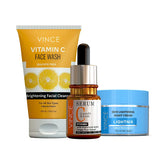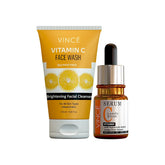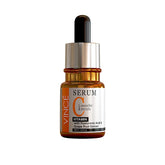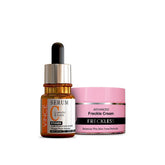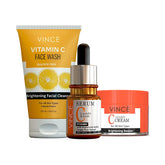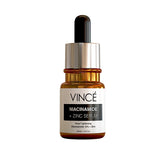Simple Skincare Routine for Acne-Prone Skin That Actually Works

Suitable natural ingredients are the key to a skincare routine for acne-prone skin, but ensure you know the right application process at the right time. Morning and evening skincare routine must have the best products for acne-prone skin. Your skincare must have all the products that not only remove acne but also stop acne production.
Moreover, hydrating, nourishing, and moisturizing products are some of the best acne skincare tips. Sunscreen is a necessary part of skincare and should be applied as a topical layer to protect your skin and other skincare products.
Always prefer a lightweight skincare routine for acne-prone skin, and if you feel itching from any skincare product, you should consult with a dermatologist. Make sure you consistently follow a skincare routine for acne-prone skin to enjoy healthy and youthful skin.
In this blog, you will learn all about the best products for acne-prone skin and how to apply them for the best results.
Causes of Acne
Inflammation, blocked hair follicles, bacteria, and a large amount of sebum in the pores are the four fundamental factors of acne. In addition to different lifestyle and environmental variables, genetics can also have an impact on these fundamental reasons.
These variables may include hormone fluctuations, extreme humidity, and stress. Acne outbreaks may also be caused by specific drugs and food choices. Acne gets worse by severely cleaning your skin or by squeezing pimples.
Best Skincare Routine For Acne-Prone Skin
Daily Face Wash Is Essential
Start your skincare routine with face wash and make sure you choose suitable ingredients that not only clean grime and dust but also fight against acne.
Do a deep massage gently and avoid hot water. Salicylic acid, benzoyl peroxide, glycolic acid, and pyrithione zinc are some of the acne skincare tips when choosing an anti-acne face wash for you.
Vince Tea Tree Face Wash is the top recommendation for acne skin. Wash your face at least three times a day to avoid harmful environmental factors like overheating, dust, grime, and stress. After face wash, you should prefer a cotton towel to dry your skin.

Gentle Cleanser For Acne
Gentle cleanser for acne is a super important part of a skincare routine for acne-prone skin because it not only deeply cleanses your skin but also ensures healthy skin and removes acne scars.
Make sure you choose acne-fighting ingredients for clear skin and stop new acne production. Foaming and micellar water cleansers are the top recommendations for acne skin. You can even choose different cleansers for your morning and evening skincare routine.
Lightweight oily cleansers are also suitable in some cases for acne-prone skin. Salicylic acid, glycolic acid, and benzoyl peroxide ingredients are gentle cleansers for acne skin. Avoid raw glycerin cleanser for acne skin because it is not comedogenic and is a big cause of skin breakouts.

Pore Refining Serum to Control Acne
How to prevent breakouts? What is the best spot treatment for pimples? What is a clear skin routine? Serum is the one-word answer to all these questions. Serums are easy to apply and give quick solutions to many skin issues.
Niacinamide helps to regulate the excess oil production, minimizing large open pores and lightening the dark spots caused by acne. The Zinc Oxide helps to soothe and heal the skin while reducing skin inflammation.
A serum with a combination of Niacinamide and Zinc will work to balance skin tone, strengthen the skin barrier, and protect against environmental stressors such as UV damage.
Gentle yet effective, Vince Niacinamide + Zinc Serum helps reduce redness, control excess oil, and refine the skin’s texture, making your skin clear, healthy, and radiant. Always perform a patch test before full application to ensure compatibility with your skin.

Non-comedogenic sunscreen is Important
No skincare product is effective unless you have a non-comedogenic sunscreen on your face as a topical layer. Sunscreen not only protects your skin from UVA and UVB rays but also ensures that other skincare products work best.
Moreover, sunscreen is a super important part of a skincare routine for acne-prone skin and helps you with quick recovery.
Vince's high-SPF sunscreen is the top recommendation for acne-friendly skincare. If you have oily acne skin, you should choose lightweight sunscreen, moreover, rich cream-based sunscreens are the best solution for dry acne skin. You must apply sunscreen all the time, whether you are going outside or working at home.

General Tips to Reduce Acne:
- Wash your face twice daily with a gentle cleanser (especially after sweating).
- Avoid touching your acne-affected skin frequently to prevent spreading bacteria.
- Keep your pillowcases and towels clean, and change them at least 2 times a week.
- Have a balanced diet, limit dairy, sugar, and processed foods; increase fruits, vegetables, and water intake.
- Keeping yourself hydrated all day by drinking water helps flush out toxins.
- Don’t pop pimples; it can lead to scarring and infection.
- Use non-comedogenic products, especially moisturizers, sunscreens, and makeup.
- Exfoliate once or twice a week with a mild scrub or chemical exfoliant to keep pores clear but remember to avoid harsh scrubbing.
Is the Morning & Evening Skincare Routine For Acne-Prone Skin the Same?
The morning and evening skincare routine for acne-prone skin is different. Sometimes, in the morning and evening, the best products for acne-prone skin are the same, but it all depends on your skin type and acne type.
You can change the hydrating moisturizer and treatment products to deal with your acne-prone skin.
A morning skincare routine requires skin protection ingredients and acne treatment products.
On the other hand, an evening skincare routine requires calming products that not only reduce the stress level but also treat your acne skin.
Important Link: Best Skincare Routine for Sensitive Skin in UAE
Conclusion
No doubt, it's difficult to deal with acne, but a suitable skincare routine for acne-prone skin is the best solution to have radiant skin.
Start your day with the best skincare routine, like washing your face gently and then cleansing your skin for deep hydration, nourishment, and cleaning.
After deep cleaning, you should moisturize your skin to relax your skin. After completing these steps, you should wait for a while before applying the next skincare products. Now, it's time for skin treatment.
Apply acne-fighting serum and gently absorb it into your skin. As a last step, you must apply the best sunscreen as a topical layer.
These steps are essential for healthy skin, but you should be consistent with your acne-friendly skincare routine to get the required results.
After doing this skincare, you can apply makeup, and skincare products will take care of the lasting and original appearance of your makeup.
In case of any itching and irritation, you should consult with your dermatologist for a deep skin checkup.
Frequently Asked Questions (FAQs)
Q1: What is the best skincare routine for acne-prone skin?
A lightweight, hydrating, and nourishing face wash or cleanser is a part of the best skincare routine for acne-prone skin. Suitable moisturizer, anti-acne serums, and non-comedogenic sunscreen are the best products for acne-prone skin. Moreover, you should follow the right order of skincare routine for acne-prone skin, like face wash, cleanser, moisturizer, Vince anti-acne serum, and sunscreen.
Q2: Can oily skin skip moisturizer in a skincare routine?
No, oily skin cannot skip moisturizer in a skincare routine. Lightweight moisturizer for oily skin is the best choice to hydrate or nourish your skin. Non-greasy moisturizers are not only best for relaxing your skin's stress but also control excessive oil production. You should apply moisturizer after face wash and cleansing to get radiant skin.
Q3: How often should I use salicylic acid serum for acne?
If your skin is sensitive, you should use salicylic acid serum two or three times a week. On the other hand, if you have severe acne on your skin, you can use salicylic acid serum four to five times a week. The use of serum depends on your skin type, you can change the number of applications according to your skin condition.
Q4: Why is sunscreen important for acne-prone skin?
Non-comedogenic sunscreen is a necessary part of a skincare routine for acne-prone skin, but make sure you use sunscreen as a topical layer. Moreover, you should prefer high-SPF sunscreen to deal with harsh sunny weather. Most importantly, sunscreen takes care of other skincare products and allows them to absorb properly into your skin for better results.
Q5: What ingredients should I look for in acne spot treatments
Benzoyl peroxide, salicylic acid, adapalene, and niacinamide are the main ingredients you should consider for acne spot treatment. Moreover, tea tree oil, Alpha Hydroxy acid, and green tea extract are the best recommendations to deal with acne skin. Make sure you choose chemical-free skincare products to avoid irritation and more acne production.

 KSA
KSA
